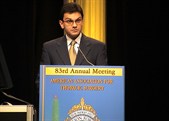 An innovative virtual reality solution to prevent delirium in patients recovering after major surgery is being tested at Harefield Hospital.
An innovative virtual reality solution to prevent delirium in patients recovering after major surgery is being tested at Harefield Hospital.
Reflecting on the anxiety felt by many patients immediately before their surgery, and the alien environment created in intensive care units by high-tech equipment and unusual sounds, consultant cardiac surgeon Mr Sunil Bhudia has developed a solution to familiarise patients with the environment and minimise confusion when they wake. Post-operative delirium (extreme confusion) affects up to 50 per cent of those undergoing major surgery and more than 80 per cent of critically ill patients. The distressing condition is associated with increased morbidity and mortality, prolonged cognitive impairment and extended hospital recovery times.
Mr Bhudia’s innovation involves showing patients a recording of a typical journey from the ward to the operating theatre and then to the intensive therapy unit (ITU), through a virtual reality headset before their surgery.
He has already made a prototype film by placing a 360 degree camera on a hospital bed at Harefield Hospital and recording the journey. The recording is all from the perspective of patients as they are wheeled from place to place.
Mr Bhudia now plans to run a pilot study using a more refined and high-definition recording of two wards, plus a noisy true-to-life ITU environment.
This is the first time virtual reality technology has been used as a solution to help patients recover from surgery. Headsets are more commonly used as a training tool to allow surgeons to practise in a virtual environment.
Mr Bhudia’s work has been recognised by Digital Health London, a collaboration between three academic health science centres and the Mayor of London. The organisation draws on the expertise of leading NHS professionals such as Mr Bhudia to pioneer the development and adoption of digital technologies in health and social care to improve health outcomes, and has named him Clinician of the Month.
Mr Bhudia said: “My aim is for every patient that comes through the pre-assessment clinic to use the virtual reality headset unsupervised, and give them the opportunity to watch the recording for as long as they like, stopping it when they like.”
“The potential of using virtual reality goes far beyond cardiac surgery, as post-operative delirium can happen after any major operation,” Mr Bhudia added. “There is the potential to expand its use onto other intensive care units across the NHS.”
Read more about Mr Bhudia’s work on the Digital Health London website.
